Anxiety often lurks beneath the surface of our daily interactions and responsibilities. It isn’t always marked by overt panic attacks or visible distress; in fact, it can present itself in much subtler ways. Hidden anxiety is that undercurrent of worry, nervousness, or unease that may not be immediately apparent to others, or even to the individuals experiencing it. It’s the kind of anxiety that doesn’t necessarily stop you in your tracks but can infiltrate your thoughts and actions quietly.
You might feel you are coping well on the outside, maintaining a veneer of normalcy in both personal and professional settings. However, internalized stress and anxiety could manifest in less obvious symptoms, such as irritability, fatigue, or sleep disturbances. These signs might be easily attributed to a busy lifestyle or brushed off as everyday stress. Yet, recognizing them is crucial. Hidden anxiety can have a wide-reaching impact on your overall well-being and quality of life, affecting everything from social dynamics to work performance, and can even manifest in physical symptoms.
Understanding your anxiety and identifying its sometimes nuanced presence in your life are the first steps toward managing it effectively. This recognition opens the door to various coping mechanisms, therapeutic approaches, and lifestyle adjustments tailored to improve mental health and increase resilience against life’s inevitable pressures.
Key Takeaways
- Hidden anxiety is a subtle, pervasive form of stress that may not be immediately obvious.
- Recognizing the less obvious symptoms of hidden anxiety is crucial for overall well-being.
- Effective management of hidden anxiety involves personalized coping strategies and lifestyle changes.
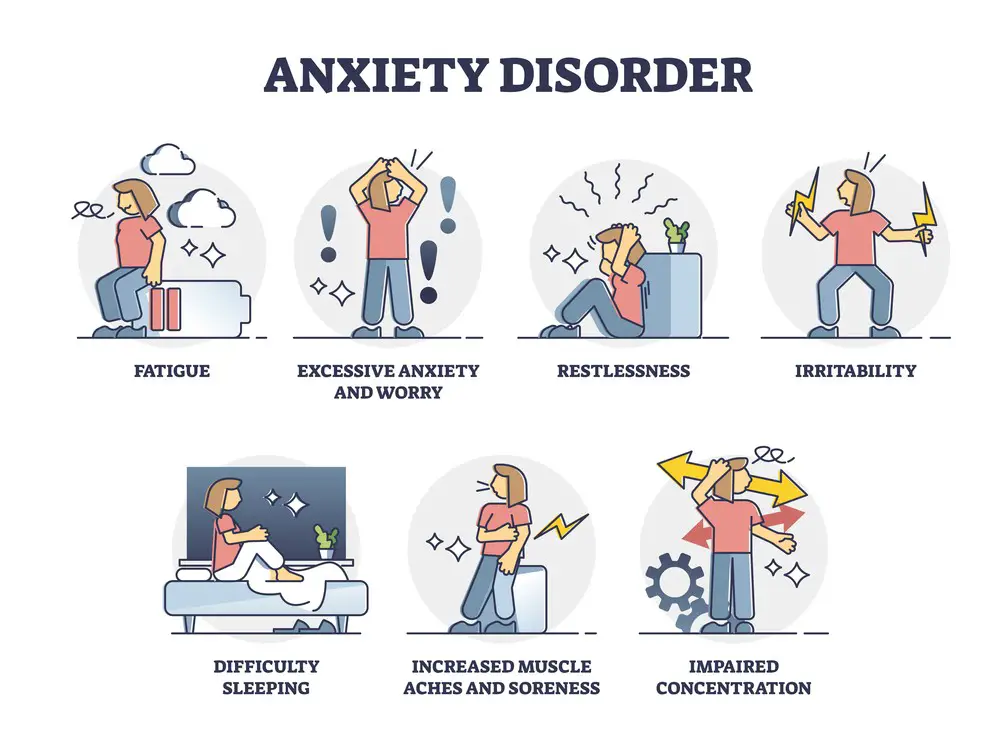
Understanding Hidden Anxiety
Hidden anxiety often goes unnoticed but can significantly impact your life. It’s crucial to identify it effectively to manage mental well-being.
Defining Hidden Anxiety
Hidden anxiety is a form of anxiety that is not immediately obvious to individuals around the sufferer, and sometimes even to the sufferers themselves. It can manifest through subtle signs and symptoms which are not typically associated with classical anxiety disorders.
- Physical Symptoms: These might include unusual fatigue, muscle tension, or a racing heart.
- Behavioral Changes: Increased irritability, difficulty concentrating, or changes in sleep patterns are key indicators.
- Emotional Patterns: You may experience an inexplicable feeling of dread or persistent worry.
Key Takeaway: Recognizing the less obvious symptoms is vital to acknowledging and addressing hidden anxiety.
Common Misconceptions
When it comes to hidden anxiety, several misunderstandings can cloud recognition and treatment.
- Anxiety Is Always Visible: Many believe that anxiety is always accompanied by noticeable nervousness or panic attacks. However, it can be much more discreet.
- Strong People Don’t Get Anxious: There’s a myth that mental toughness or emotional strength negates the presence of anxiety, which is not valid. Anyone can experience hidden anxiety.
- It’s Just Stress: Sometimes what is brushed off as just daily stress could be a sign of a deeper issue like hidden anxiety.
Key Takeaway: Dispelling myths about anxiety is a crucial step toward proper understanding and support for those affected.
 Signs and Symptoms
Signs and Symptoms
In uncovering hidden anxiety, paying close attention to various signs and symptoms can be pretty revealing. Your body and mind often signal distress in ways that you may not immediately associate with anxiety.
Physical Indicators
When anxiety takes a toll, your body typically sends out physical signals. Some of the most common physical symptoms include:
- Headaches: These might manifest as persistent or recurrent pain, often accompanying stressful periods.
- Nausea: You may experience stomach discomfort or sickness, particularly in anxious situations.
- Fatigue: Even after sufficient rest, you may still feel overwhelmingly tired.
- Trouble sleeping: Difficulty falling or staying asleep is a frequent unwelcome visitor.
- Muscle tension: Feelings of tightness, especially in the neck and shoulders, are commonplace.
- Shortness of breath: Episodes of rapid breathing or feeling like you can’t catch your breath may occur.
- Racing thoughts: Your mind might feel like it’s constantly running at full speed, making it tough to relax.
Key Takeaway: Remember, your body might be sounding the alarm about anxiety through these unwelcome physical guests.
Cognitive and Emotional Manifestations
Your thoughts and feelings also play a crucial role in signaling hidden anxiety:
- Racing thoughts are often a hallmark, with your mind bouncing from one worry to the next.
- You might find yourself lost in “what if” scenarios, always anticipating the worst-case outcome.
- A feeling of doom or excessive worry over everyday situations can indicate underlying anxiety.
- Decisiveness becomes challenging as doubt creeps into every decision.
By understanding these cognitive and emotional signs, you can better recognize and address your hidden anxiety.
Key Takeaway: Stay vigilant to the whispers of your thoughts and feelings—they could be critical informants of hidden anxiety.
Causes of Hidden Anxiety
Understanding the roots of hidden anxiety is fundamental to managing its grip on your daily life. It’s often a complex interplay between your genetic makeup and the world around you.
Genetic and Environmental Factors
Your family history plays a significant role in your predisposition to anxiety. If your parents or siblings grapple with anxiety disorders, you’re more likely to experience similar challenges. It’s not a certain fate, but a clue to be mindful of.
- Genetic Links: Anxiety can be hereditary, passing down through genes.
- Environmental Stressors: Early childhood trauma, such as abuse or neglect, can set the stage for hidden anxiety later in life.
Key Takeaway: You may not have control over your genetic predisposition, but knowing it can guide you toward early intervention.
Lifestyle and Triggers
Daily habits and life events are often the sparks that ignite anxiety’s flame. Recognizing these triggers can be a powerful step in taking control.
- High Stress Levels: Prolonged stress can evolve into generalized anxiety disorder.
- Work Pressure: Demanding jobs can increase your stress, becoming a breeding ground for anxiety.
- Poor Sleep Habits: Lack of rest can heighten your anxiety levels.
Key Takeaway: Identifying and modifying lifestyle triggers can help you manage your anxiety more effectively.
High-Functioning Anxiety
Recognizing high-functioning anxiety is crucial because it often masquerades as mere ambition, discreetly undermining well-being with its weighty demands.
Characteristics
- Persistent Overthinking: You may find your mind constantly racing, planning, and preparing for worst-case scenarios, even without real danger.
- Excessive Perfectionism: An unyielding drive for flawlessness can cause you to set extraordinarily high standards for yourself in every aspect of life.
- Compulsive Overworking: Being exceptionally productive and continually busy is typical, masking underlying nerves with a facade of achievement.
- Chronic Restlessness: Despite achieving goals, you might rarely feel satisfied, always looking to the next task with an uneasy eagerness.
Challenges and Coping
Overcoming Paralysis by Analysis
- Simplify decision-making by setting time limits.
- Break tasks into smaller, manageable actions to avoid feeling overwhelmed.
Easing Perfectionism Pressures
- Embrace “good enough” by acknowledging the impracticality of perfection.
- Recognize the value of progress over perfection to reduce self-imposed stress.
Boundary Setting to Deter Overworking
- Schedule downtime to ensure rest and recovery.
- Learn to delegate and trust others with responsibilities.
Finding Calm in Restlessness
- Engage in mindfulness practices to anchor your thoughts in the present.
- Regular exercise can help channel restless energy productively.
Key Takeaway: By understanding the characteristics of high-functioning anxiety and employing targeted strategies, you can mitigate its challenges and embrace a more balanced life.
Social Dynamics and Anxiety
When you navigate social settings, the interactions can significantly shape your experience of anxiety. Your ability to connect with others often hinges on your internal comfort and confidence.
Impact on Relationships
Social anxiety can strain your connections with friends, colleagues, and loved ones. It might manifest as a fear of judgment or a distressing sense of potential failure in social exchanges. Let’s consider how this anxiety affects your relationships:
- Decreased Interaction: You may interact less frequently with others due to the worry of being negatively evaluated.
- Misunderstanding: Often, your behavior might be misread as disinterest or aloofness, leading to miscommunication.
- Support Systems: Strong relationships provide support, but social anxiety can limit your ability to reach out, eroding these crucial networks.
Key Takeaway: Invest in open communication with your circle to mitigate misunderstandings and bolster your support system.
Avoiding Social Interaction
Avoidance is a common coping strategy for managing the discomfort that comes with social events. Here’s how this might unfold for you:
- Missed Opportunities: By avoiding gatherings or events, you miss chances to form meaningful relationships and experiences.
- Reinforcement of Anxiety: The more you avoid, the more daunting social settings seem, reinforcing the cycle of anxiety.
- Professional Limitations: In the workplace, avoiding social interactions could impede networking prospects or collaboration opportunities.
Key Takeaway: Tackle avoidance by taking small, manageable steps toward engaging in social situations to build your confidence gradually.
Effects on Work and Productivity
Hidden anxiety can quietly chip away at your work performance and productivity, shaping how you manage stress, approach tasks, and perceive your abilities.
Workplace Anxiety
Understanding the Impact: You might notice hesitation or reluctance in starting tasks and a rise in procrastination. It’s not just a lack of motivation but an invisible battle; your internal dialogue might go into overdrive, making you overthink simple decisions and tasks. Let’s break it down:
- Procrastination: You tend to delay tasks, not from a lack of knowledge or ability but from an underlying fear that the output won’t be perfect.
- Overthinking: Making decisions can become an ordeal as you consider all possible outcomes, often leading to analysis paralysis.
Strategies to Navigate:
- Set Clear Goals: Create small, manageable goals to tackle procrastination and build momentum.
- Embrace ‘Good Enough’: Combat perfectionism by redefining standards for human error and growth.
Key Takeaway: Recognize when you’re procrastinating or overthinking due to anxiety, and employ practical strategies to regain control and enhance focus.
Balancing Stress and Performance
Finding Equilibrium: Your pursuit of being exceptionally productive can lead to a paradox where the stress from striving for excellence hampers the very performance you’re working to improve. Balancing this can be intricate but achievable.
- Motivation vs. Stress: While some stress can fuel your motivation, too much can be counterproductive, leading to a downturn in your work quality.
- The Perfectionism Trap: Striving for flawless work can create insurmountable stress. Instead, aim for progress and continuous improvement.
Performance Tips:
- Prioritize Tasks: Identify what’s urgent and important to manage your workload and stress better.
- Mindful Breaks: Integrate short breaks into your day to reset your mind and maintain peak performance.
Key Takeaway: It’s crucial to strike a delicate balance between healthy stress that motivates and excessive stress that cripples productivity. Aim for sustainable excellence rather than unattainable perfection.
Anxiety and Physical Health
Anxiety isn’t just a psychological issue—it can manifest physically, too. Your body and mind are interconnected, so your mental health can significantly impact your physical well-being.
 Body-Mind Connection
Body-Mind Connection
Your mind’s state directly influences your body through a network of nerves, hormones, and chemicals. Here’s how anxiety can affect you physically:
- Gastrointestinal Issues: When anxious, your body may enter a fight-or-flight mode, leading to digestive problems like stomachaches or diarrhea.
- Muscle Tension: Stress and anxiety commonly cause muscles to tense up, resulting in pain and discomfort over time.
Key takeaway: Recognizing the physical signs of anxiety can help you address these issues early on.
Long-Term Health Consequences
The impact of anxiety on your body can extend beyond immediate symptoms to more long-term health issues:
- Headaches: Persistent anxiety may lead to chronic headaches or migraines caused by muscle tension or hormone changes.
- Fatigue: Anxiety can disrupt your sleep patterns, resulting in chronic tiredness, which compounds stress, forming a difficult cycle to break.
Key takeaway: Managing anxiety is crucial not just for your mental health but to prevent chronic physical conditions as well.
 Coping Mechanisms
Coping Mechanisms
When dealing with hidden anxiety, implementing specific strategies and habits can be effective tools in regaining control. Let’s explore actionable techniques that can be incorporated into your daily routine.to your daily routine.
Healthy Routines
Establishing healthy routines plays a crucial role in mitigating the effects of anxiety.
- Exercise: Committing to a regular exercise routine can significantly reduce anxiety levels. Physical activity increases endorphins, which are natural mood lifters. Choose activities you enjoy to ensure consistency, whether a brisk walk, yoga, or cycling.
Type of Exercise Benefit Cardiovascular Reduces stress hormones Strength Training Boosts self-esteem Flexibility Workout Enhances mental relaxation - Nutrition: Pay attention to your diet. Foods rich in omega-3 fatty acids, magnesium, and vitamin B12 can help manage anxiety. Incorporate foods like salmon, leafy greens, and nuts into your meals.
- Sleep: Prioritise sleep to help your body and mind recover. Aim for 7 to 9 hours a night and establish a consistent sleep schedule, even on weekends.
Key Takeaway: Structuring your day with exercise, proper nutrition, and adequate sleep can create a stable foundation to handle anxiety more effectively.
 Relaxation Techniques
Relaxation Techniques
Implementing relaxation techniques can dramatically lessen the impact of hidden anxiety.
- Mindfulness: Practicing mindfulness encourages you to live in the present moment, helping to reduce anxious thoughts. Mindfulness can be practiced at any time—focus on your breathing and observe your thoughts without judgment.
- Meditation: Engaging in regular meditation can help you achieve a state of relaxation and tranquility. Start with a few minutes every day and gradually increase the duration. Meditation apps or guided sessions may be helpful when you’re getting started.
Meditation Technique Description Guided Meditation Follows a narrator’s instructions Mantra Meditation Repeats a calming word or phrase Mindfulness Meditation Focuses on the present experience - Breathing Exercises: Simple breathing techniques can be effective in calming your anxiety. Practice deep, diaphragmatic breathing for several minutes whenever you feel overwhelmed.
Key Takeaway: Regularly using mindfulness, meditation, and breathing exercises can be invaluable tools for navigating the waters of concealed anxiety with a sense of calm.
Therapeutic Approaches
In managing hidden anxiety, two pivotal steps involve professional counseling and medication where necessary. The right mix of these treatments can lead to significant improvements.
 Professional Counseling
Professional Counseling
Consulting a mental health professional often marks the beginning of the healing process. A therapist skilled in Cognitive Behavioral Therapy (CBT) can equip you with strategies to tackle the underlying thought patterns fueling your anxiety.
- Tip: Prioritize finding a therapist you feel comfortable with; this relationship is crucial to your journey.
- Strategy: Embrace the process of regular sessions and homework that may be part of your therapy.
Key takeaway: Professional counseling with a therapist, especially utilizing CBT, can provide you with the tools to understand and manage your anxiety.
Medication and Treatment
Occasionally, when anxiety persists or becomes overwhelming, medication may be integrated into your treatment plan. Selective Serotonin Reuptake Inhibitors (SSRIs) are commonly prescribed to help balance brain chemistry associated with anxiety symptoms.
- Remember: Medications like SSRIs are more effective when combined with therapy.
- Caution: Always consult your mental health professional before starting or changing any medication.
Key takeaway: Medication, in conjunction with counseling, can help regulate your anxiety, but it’s crucial to have these prescribed by a qualified professional.
Lifestyle Adjustments for Anxiety Management
Making small changes in your daily routines and adopting stress-reduction techniques can significantly improve your ability to manage anxiety.
Daily Habits
Good morning routines can set a positive tone for the day. Begin with a balanced breakfast to fuel your body, and integrate at least 30 minutes of exercise, ranging from a brisk walk to a full workout, to energize your mind and reduce stress hormones. Establish a nightly routine to signal to your brain that it’s time to wind down, incorporating elements that promote sleep hygiene, such as dimming the lights and reducing screen time an hour before bed. Consistency with these habits is key; your body thrives on regularity.
- Exercise: Daily physical activity, even gentle movements like stretching or yoga.
- Consistent sleep schedule: Aims for 7-9 hours of restful sleep.
- Nutritious meals: Incorporate fruits, vegetables, lean proteins, and whole grains.
Key Takeaway: Regular exercise, sufficient sleep, and a nutritious diet are cornerstones of a lifestyle that can help you manage anxiety effectively.
 Stress-Reduction Strategies
Stress-Reduction Strategies
Finding techniques that help you reduce stress is vital. Deep breathing exercises and meditation can lower stress levels when practiced regularly. Make a list of activities you enjoy, such as reading or gardening, and carve out time for them in your week. These pleasures can act as a buffer against anxiety.
- Mindfulness practice: Engage in meditation or deep breathing for at least 10 minutes a day.
- Leisure activities: Schedule time for hobbies and interests to break the monotony and rejuvenate your spirit.
Key Takeaway: Incorporating stress-reduction strategies into your daily life can build resilience against anxiety triggers over time.
Support Systems and Resources
In navigating hidden anxiety, knowing where to turn for support and guidance is crucial. The right resources can provide comfort and a roadmap to better managing your mental well-being.
Finding Help
When you’re facing anxiety that’s not immediately apparent to others, finding help may seem daunting. Here’s how you can start:
- Identify local mental health professionals: Look for therapists or counselors specializing in anxiety. Your family doctor can offer a referral.
- Get informed about therapy options: Cognitive Behavioral Therapy (CBT), for example, is a structured approach known to benefit anxiety disorders.
Key takeaway: Seeking professional advice is valuable in managing your anxiety and developing coping strategies.
Community and Online Support
You don’t have to manage anxiety in isolation; community and online support can be lifelines:
- Join support groups: Connect with others who understand what you’re going through. Look for local or virtual anxiety support groups.
- Leverage online forums: Websites like the Anxiety and Depression Association of America (ADAA) offer resources and online forums.
Key takeaway: Tapping into community and online resources can offer camaraderie and practical advice to alleviate feeling alone in your struggles.
Frequently Asked Questions
High-functioning anxiety often flies under the radar, but it can significantly impact your day-to-day life. Recognizing the signs and managing them can make a real difference.

What are the common indicators of high-functioning anxiety?
You might notice yourself overthinking about minor details or feeling constantly on edge. Nervous habits, like nail-biting, can be a telltale sign. Being a perfectionist or having an intense fear of failure are other indicators that you’re experiencing high-functioning anxiety.
Key takeaway: Awareness of these signs can help you acknowledge and address your anxiety.
What strategies are effective in managing high-functioning anxiety?
Try to establish a calming routine that includes activities like meditation or yoga. Prioritize tasks and set realistic goals to reduce overwhelm. If you’re struggling, don’t hesitate to contact a therapist who can provide tailored strategies.
Key takeaway: Implementing stress-reduction techniques can alleviate the effects of anxiety.
What are the potential causes behind high-functioning anxiety?
This form of anxiety could stem from a variety of factors, including genetic predispositions, personality traits, or past traumas. High expectations set by yourself or others may also contribute to feelings of anxiety.
Key takeaway: Pinpointing the root causes can be the first step to managing your anxiety more effectively.
How can someone assist a person coping with high-functioning anxiety?
If you’re looking to support someone, encourage open conversations without judgment. Offer to help with task management or finding professional help. Small gestures of understanding can significantly ease their burden.
Key takeaway: Compassionate support can be invaluable to someone dealing with high-functioning anxiety.
Can high-functioning anxiety lead to burnout, and how can it be prevented?
Without a doubt, this type of anxiety can push you to burnout if left unchecked. To prevent it, ensure you take regular breaks and set firm boundaries. Learning to say no and recognizing your limits are crucial preventive steps.
Key takeaway: Balance and self-care are your allies against the risk of burnout.
What physical manifestations may suggest the presence of high-functioning anxiety?
Physical symptoms can include restlessness, an upset stomach, or muscle tension. You might also experience fatigue or have trouble sleeping despite feeling mentally wired.
_Key takeaway: Your body often signals what your mind tries to conceal, so listen closely.
- How to Reduce Anxiety Immediately: Quick and Effective Techniques - February 15, 2024
- Can Stress Cause Bloating? Understanding The Link Between Stress And Digestive Issues - February 15, 2024
- The Best Time To Sleep: A Guide To Optimal Rest - February 15, 2024
This site contains affiliate links to products. We will receive a commission for purchases made through these links.

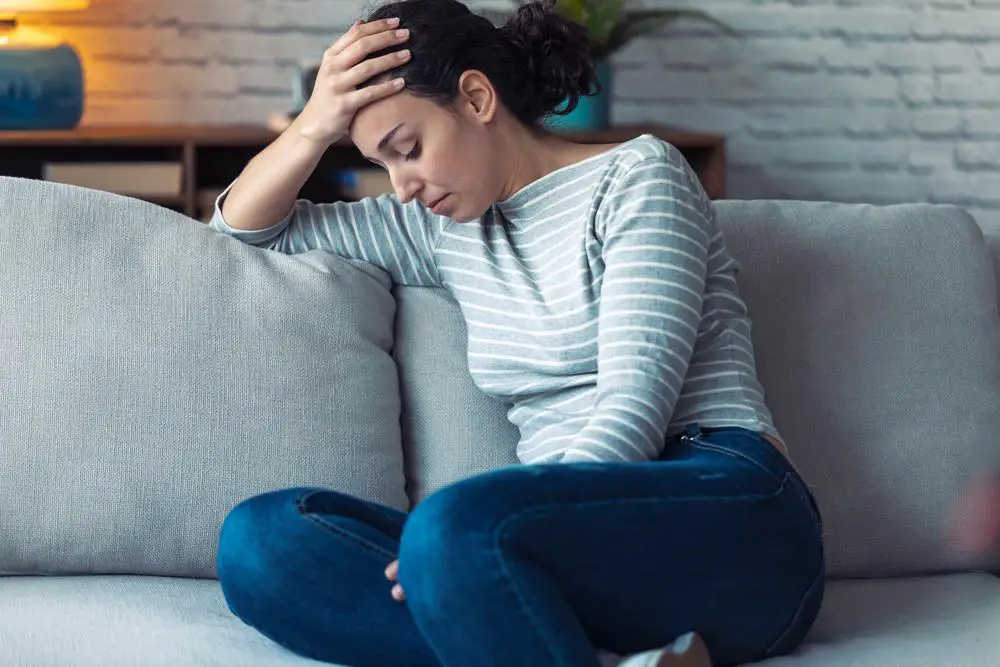
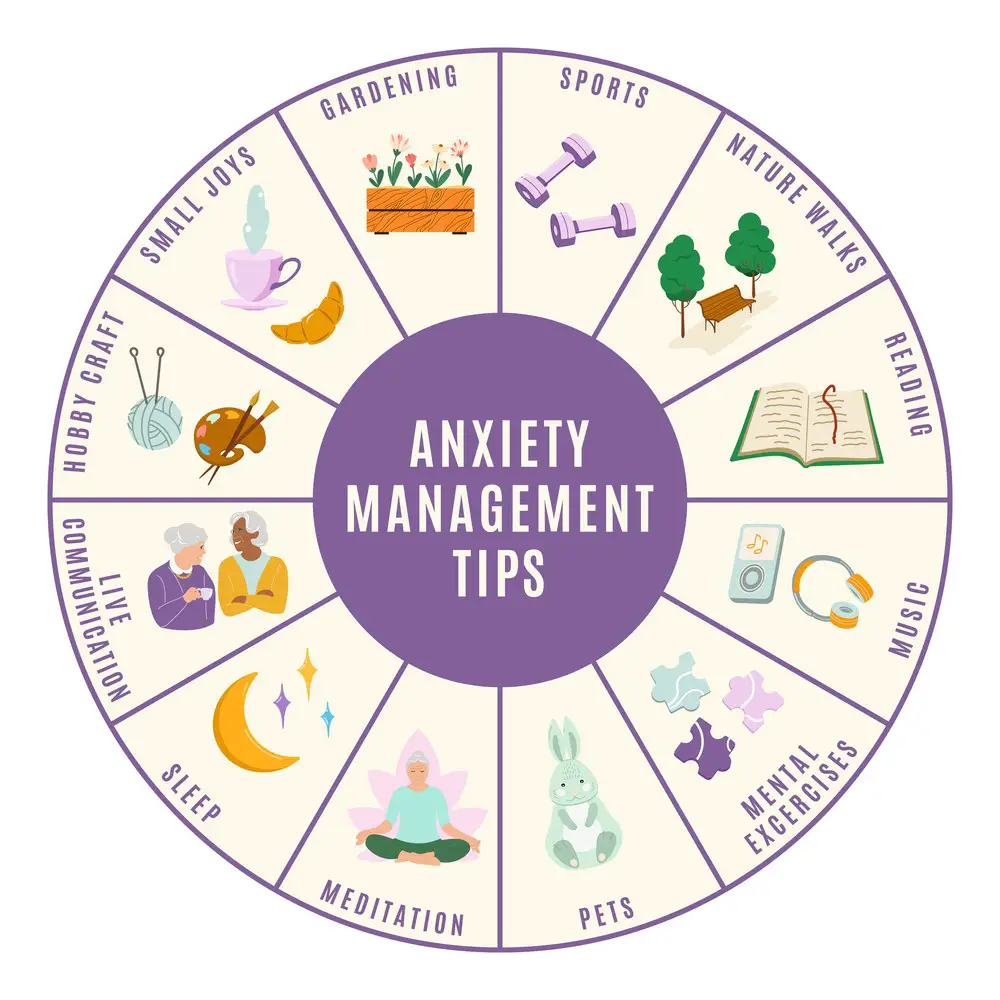 Signs and Symptoms
Signs and Symptoms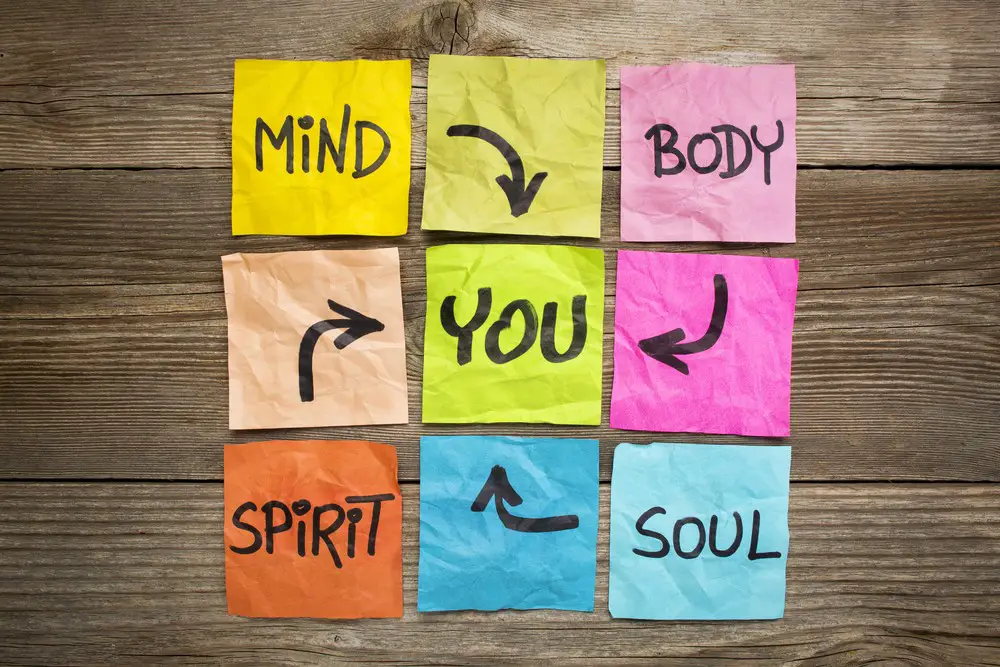 Body-Mind Connection
Body-Mind Connection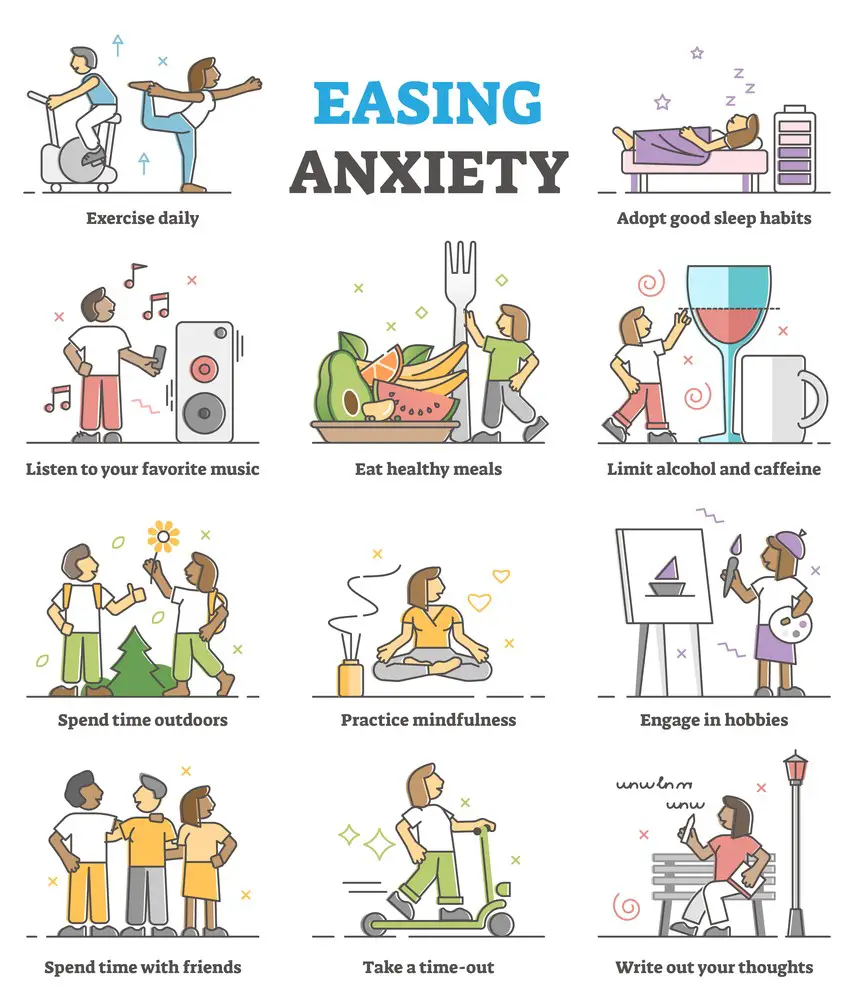 Coping Mechanisms
Coping Mechanisms Relaxation Techniques
Relaxation Techniques Professional Counseling
Professional Counseling
